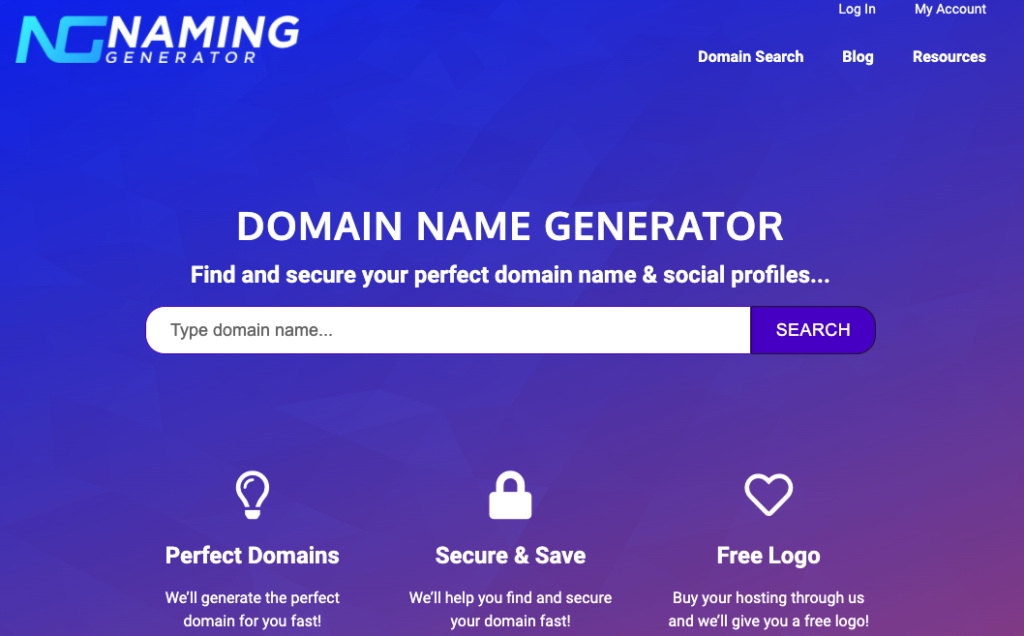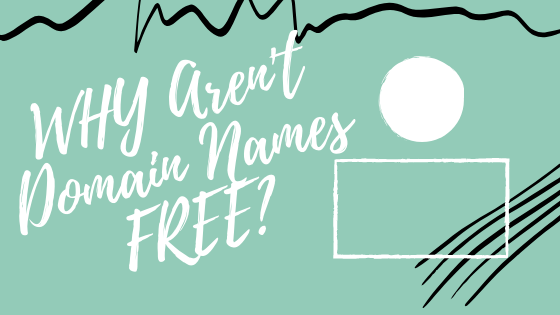Why Aren’t Domain Names FREE?
Whether you own an existing business or about to launch a new one, it’s likely needing an online presence that has crossed your mind. Business owners in the internet age are almost unanimous about the significance of an online aspect is crucial to success, which often starts with a domain name.
As you research what it takes to create a website questions around domain names may arise. In this article, we will discuss why domain names aren’t free.
As a website owner, you understand potential customers typically do a web search first as they start on the buying process. If you have a website that is easy to find and convenient to navigate, this increases the chances of a sale.
That’s where your domain name comes in…
A domain name is a website’s “location” on the worldwide web. Domain names translate the digits making up an IP (internet protocol) address into something memorable to people. Domains are purchased through Domain Name Registrars – companies that manage the reservation of domain names and direct searchers to your website.
So, why aren’t domain names free-of-charge? When you buy a domain name through a Domain Name Registrar, these entities manage the registration of your domain name of choice. After you have bought a domain name, the next step is to contract a hosting provider to manage your website. Now, some companies provide both services: domain name registration and hosting. Whether you go through two separate entities for domain name registration and website management (hosting) or opt for a package, these services will cost you. Consider it as a capital and/or operational expense toward the success of your business.
As earlier explained, a domain name is the human-readable version of your website address.
Let us break it down for you this way: take Google for example. Google’s domain name is “google.com”. If you want to go to Google, all you need is to type up “google.com” into your web browser’s address bar.
In reality, though, your computer does not actually understand where “google.com” is. What we don’t see is that the internet uses numerical IP addresses.
One of Google.com’s IP addresses is 172.217.0.142. And if you type this numerical series into your web browser’s address bar, you’d also end up at Google’s website.
Your domain name is, in essence, your identity on the internet. And the internet is a sure gateway to the immense world of customers out there. This is why business owners would, of course, logically want domain names that carry their business identity.
But with all the businesses around the world, it is not uncommon for two businesses to share the same name.
If someone already has the domain name that you want, you might still be able to buy it, but expect that it will cost you more than if you were getting an original domain name from a domain registrar. If you don’t want to pay a premium for an already owned domain, use our FREE domain name generator to find great available domains.

A number of enterprising individuals register domains they think are potentially profitable and then sell them on domain marketplaces like Sedo and Afternic.
Take a look at our youtube video explanation here.
What Are You Getting When You Buy a Domain Name?
Let us reiterate that your domain is not a website, it is simply the “name” of your website on the internet. Sure, you’ve reserved/registered the name… but you will still need the actual website: content, interface, and all.
If you purchased your domain through your hosting provider, it is likely that you already have your website set up for you, as well. But if you’ve just bought the domain name, you will need to refer it to a hosting provider next.
Now, you have to pay attention to this part: Just because a domain name has your website hooked up to it, it does not mean that you are the legal owner.
It happens a lot that a business owner is surprised to learn that he does not own his domain name. Most often, it’s the website developer who owns it. This is a tricky situation to be in, especially when the business owner decides to move to a different website developer.
So, when you buy a domain name for your company, especially if it’s through a hosting provider, make sure that your name (or an entity you own) is registered as the owner. The registered domain name owner has total control of it, including what website the domain name directs to, what domain name registrar maintains it, and only this registered owner can sell it, should the need ever arise.
How Much Do Domain Names Cost?
Simply speaking, the average cost for a brand new domain name will typically be anywhere between $10 and $12, depending on the registrar you choose and the duration of your registration contract.
The cost of a domain name varies, depending on a number of factors. For instance, be prepared to spend a bit more on a domain name that is already owned by another entity.
As we mentioned earlier, you can save money by using our FREE domain name generation tool to find available domains.
Believe it or not, some older domains have gone for millions of dollars, specifically domains that are very broad like single-word, encompassing domain names (like insurance.com, hotels.com, and investing.com). If you decide you want a single-word, previously-owned domain, then be prepared to spend a lot of money to secure it for yourself.
Our Naming Generator also provides offers from hosting companies to get your new domain for free.
What Domain Extensions are Worth Paying Extra For?
We all know that the .com domain extension (or suffix) has long been considered as the gold standard of gTLD’s (generic top-level domains) – the term used for whatever follows the dot in the URL of a particular website.
Although gTLD’s such as .net and .org have become more widespread and well-received, the distinction of a .com website still influences many businesses and entities to pay top dollar for it.
Just how important is a domain name extension? An experiment with 1,500 respondents and comparing the top eight gTLD’s (.com, .net, .org, .co, .biz, .us, .blog, and .io) yielded the following results, among others:
- .com domains are over 33% more memorable compared to URLs with other TLD’s.
- .com is the number one in most trusted TLDs, with .co coming up at close second.
- When people recall a URL wrongly, they are 8x more likely to assume it ends in .comthan anything else.
In terms of perceived trustworthiness on a scale of 1 – 5: .com came out as the number 1 most-trusted domain extension, with .co also coming up a close second. This is followed by .org and .us, each scoring a 3.3. Trailing behind is .biz with a 2.9 trust rating – about 17% lower than .com’s trust score. And .io doesn’t do any better than that.
The most important take-away from the said experiment is that a URL that people trust AND remember is more likely to get clicked on, linked to, and shared and it’s easier to build a brand with something like this.
Dubbed as the “big three”, .com, .net and .org are the longest-running and most widely-used domain extensions. These three have grown in importance with the development of search engines and search engine optimization (SEO), resulting in increased scrutiny of the advantages of each domain extension.
Although, sometime in August in 2015, Google surprised everybody by announcing its plans to restructure its business and fold itself into a holding company known as Alphabet, hosted at the URL “abc.xyz.” However, the bigger surprise to some observers was the new company’s use of the .xyz domain, rather than the old .com superstar.
This bold move probably got a lot of us asking if we should (or not) jump aboard the alternative domain extension (which some people have smartly dubbed “not com”) bandwagon, as well. Non-advocates of this convention that believe that a not com domain name can be disadvantageous to a business’ brand.
Going not .com or sticking to the good ol’ TLD would depend in large part on your brand persona. The new domain extensions emerging (such as .finance, .agency, etc.) may provide a cost-effective way to signal to your customers that you’re a brand that does not sit quietly with the status quo. If you have an innovative product or service or if you have a “challenger” brand personality, alternative domain name extensions might be worth your every dollar.
Read more on how to find a great cheap domain name article.
How to Get Your Domain for Free with a Hosting Plan
We make it easy to get a free domain, check out the free domain offers on our home page.
Website hosting is something that is inevitable when building a website. Look for a website hosting provider that will make it easier to grow your online presence, allow you good user experience, and prevent a lot of painful headaches along the way.
It is common nowadays for web hosting companies to give away domain names for free to customers who will likewise host their websites with them. The cost of the domain name might be packaged together with the hosting fee.
Other companies may offer a free domain name in exchange for displaying ads on your site. Also, some domain registrars allow you to “earn” your domain name by way of customer referrals.
There are some services that offer free domain names, provided that you use a specific TLD. These services, however, should be avoided as they typically offer obscure ccTLD’s (country code top-level domains) like .tk (Tokelau) or .cf (Central African Republic). Not only do these TLD’s make your domain name look unprofessional, but they’ll make ranking in Google much more of a challenge.
Website experts recommend avoiding any hosting offers that, sure, may save you $10 annually in exchange for relinquishing control of your website to them. Doing so will cost you much more in time, energy, and money, in the long run.
Your brand says everything about you, your values, your identity, and your promise. Your domain name should not be any different. Your website is the core of your online presence. You should select a domain name that parallels, if not matches, the company name so as not to confuse existing and potential customers.
Deciding on and, eventually, buying your domain name and having your website hosted should be treated as a real investment critical to your business’ success. The good news there is a fast and convenient way to find available domain names best for your business, with or without hosting. The first step toward the investment in your online presence is finding the perfect domain name – an endeavor that an online domain name generator tool can easily help you with. Here, you can find tons of available domain names that you can register. You can likewise get great registrar and hosting recommendations that can all bring your online business goals one step closer to reality.
SOURCES
https://www.howtogeek.com/393534/buying-a-domain-name-here%E2%80%99s-what-you-need-to-know/
https://www.seobuzzinternetmarketing.com/blog/do-you-own-domain-name/
https://www.hostgator.com/blog/how-much-website-domain-name/
https://www.hostgator.com/blog/new-domain-name-next-steps/
https://www.thesitewizard.com/archive/registerdomain.shtml
https://www.whoishostingthis.com/blog/2014/07/29/website-cost/
https://www.eurodns.com/blog/premium-domain-names
https://www.websitebuilderexpert.com/building-websites/domain-name-cost/
http://www.techtimes.com/articles/76558/20150816/is-google-alphabet-xyz-the-new-com.htm
https://www.woodst.com/web-design-development/new-domain-extensions-worth/
https://novanym.com/pages/why-com-is-the-best-domain-extension-for-seo
https://growthbadger.com/top-level-domains/
https://www.ventureharbour.com/free-domain-name/







